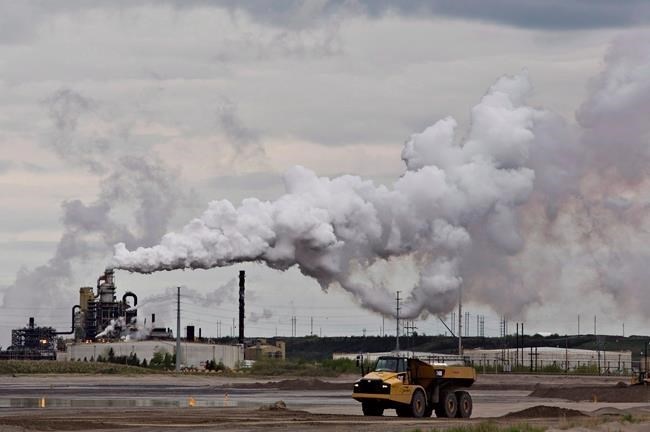
A dump truck works near the Syncrude oil sands extraction facility near the city of Fort McMurray, Alta., on June 1, 2014. The federal government's carbon pricing scheme is constitutionally sound and has the critical purpose of fighting climate change, Ontario's top court ruled in a split decision on Friday.
Image Credit: THE CANADIAN PRESS/Jason Franson
June 28, 2019 - 10:50 AM
TORONTO - The federal government's carbon pricing scheme is constitutionally sound and has the critical purpose of fighting climate change, Ontario's top court ruled in a split decision on Friday.
The Greenhouse Gas Pollution Pricing Act, enacted in April, is within Parliament's jurisdiction to legislate in relation to matters of "national concern," Chief Justice George Strathy wrote on behalf of the court.
"Parliament has determined that atmospheric accumulation of greenhouse gases causes climate changes that pose an existential threat to human civilization and the global ecosystem," Strathy said.
"The need for a collective approach to a matter of national concern, and the risk of non-participation by one or more provinces, permits Canada to adopt minimum national standards to reduce (greenhouse gas) emissions."
Ontario's Progressive Conservative government under Premier Doug Ford, who calls the carbon charge an illegal tax, had argued the act is a violation of the Constitution because it allows the federal government to intrude on provincial jurisdiction. During four days of submissions in April, Ontario insisted the act would undermine co-operative federalism.
Provincial lawyers told the Court of Appeal the federal government would end up with the power to regulate almost every facet of life — such as when you can drive, where you can live, or whether you can have a wood-burning fireplace. They also argued the province has its own approach to the climate-change issue.
For their part, federal lawyers argued the province was fearmongering. The law, they said, would not result in an expansion of constitutional powers that would give Ottawa carte blanche to regulate issues that fall within provincial jurisdiction. The act was a legitimate response to potentially catastrophic climate change, federal lawyers argued.
The majority of the Appeal Court agreed with Ottawa and rejected Ontario's contention that the carbon levy is an illegal tax.
"The charges imposed by the act are themselves constitutional," Strathy wrote. "They are regulatory in nature and connected to the purposes of the act. They are not taxes."
The effect of the charge is to put a price on carbon pollution, thereby limiting access to a scarce resource: the atmosphere’s capacity to absorb greenhouse gases, Strathy said in the decision. The pricing mechanisms also "incentivize behavioural changes," he said.
No single province or group of provinces can establish minimum national standards to reduce emissions, the court said. Their efforts can be undermined by the "action or by the inaction" of other provinces.
"The reduction of (greenhouse) emissions cannot be dealt with in a piecemeal manner," the court said. "It must be addressed as a single matter to ensure its efficacy. The establishment of minimum national standards does precisely that."
In a dissenting opinion, Justice Grant Huscroft said climate change did not amount to an "emergency case" and warned against allowing rhetoric to colour the constitutional analysis.
"Carbon pricing is only one approach to addressing (greenhouse gas) emissions — one of many policy options that might be chosen, whether alone or as part of a broader strategy," Huscroft said. "There are many ways to address climate change and the provinces have ample authority to pursue them."
The federal act currently only applies in four Conservative provinces — Ontario, Manitoba, New Brunswick and Saskatchewan — which Ottawa says don't meet national standards.
In all, 14 interveners — among them some provinces, Indigenous groups and environmental and business organizations — lined up to defend or attack the law, with most siding with Ottawa. Indigenous groups, for example, stressed their vulnerability to global warming that they said could destroy their way of life.
Some observers said the Ontario challenge was more about politics than the environment.
The issue is expected to be ultimately decided before the country's top court. In May, Saskatchewan's top court in a 3-2 decision upheld the carbon pricing law as constitutional in a similar case. The Supreme Court of Canada has already said it will hear Saskatchewan's challenge of that ruling in December — after the October federal election.
News from © The Canadian Press, 2019